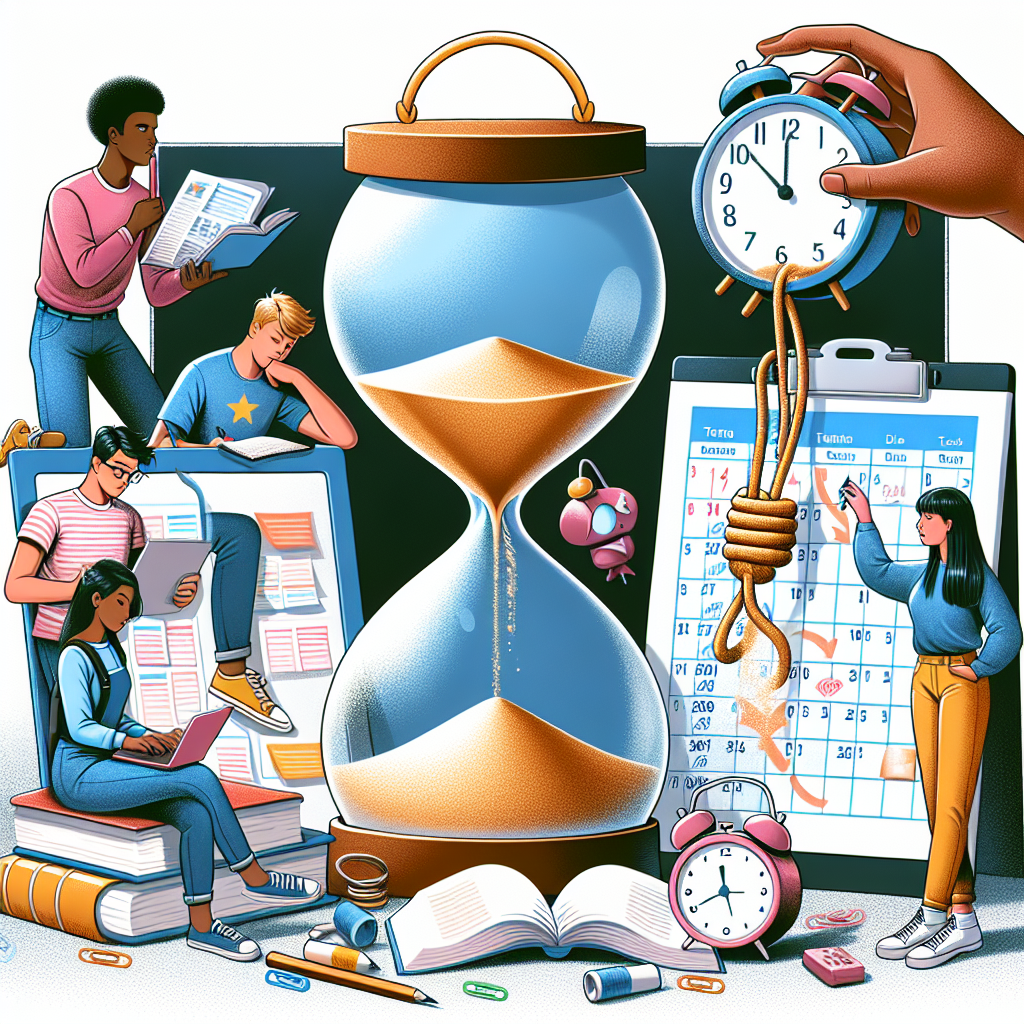Are you a student looking to improve your time management skills? In today’s fast-paced world, it’s crucial to organize your time effectively in order to achieve success in your studies and personal life. This article will provide you with practical tips and strategies to develop effective time management skills, allowing you to maximize productivity, reduce stress, and accomplish your goals efficiently. Whether you’re struggling with balancing schoolwork, extracurricular activities, and social life or simply want to become more organized, this guide will equip you with the tools you need to thrive as a student.
Setting Goals
Setting goals is an essential first step in developing effective time management skills. By identifying your priorities, you can focus your time and energy on what truly matters. Start by making a list of all the tasks, assignments, and responsibilities you have. Then, determine which ones are most important and require immediate attention. These are your priorities.
Next, you need to set both long-term and short-term goals. Long-term goals are those that you want to achieve in the future, such as earning a certain grade or completing a project. Short-term goals, on the other hand, are more immediate and can be accomplished within a shorter time frame, such as finishing a homework assignment by the end of the day. By setting both types of goals, you not only have a clear direction but also a sense of accomplishment as you achieve each milestone.
To help you stay organized and stay on track, creating a task list is essential. This list acts as a roadmap for your day, outlining all the tasks you need to complete. Be sure to prioritize your tasks based on their importance and urgency. By having a task list, you can keep track of what needs to be done and ensure that nothing falls through the cracks.
Creating a Schedule
Time management is all about making the most of the time you have available. To effectively manage your time, it’s crucial to analyze your time commitments. Take a detailed look at your schedule and identify any existing obligations, such as classes, extracurricular activities, or work. By understanding your time constraints, you can better allocate your time for tasks and activities.
Once you have identified your time commitments, it’s time to allocate specific time slots for tasks. Use your task list as a guide and assign realistic time blocks for each task. Be sure to consider factors such as the complexity of the task, your energy levels, and the amount of focus it requires. By creating a schedule that accounts for each task, you can ensure that you have enough time to complete everything without feeling overwhelmed.
Using calendars and planners can also greatly enhance your time management skills. utilize digital calendars or physical planners to keep track of your schedule, to-do lists, and deadlines. Set reminders and alerts to ensure that you stay on top of your tasks and don’t miss any important dates. By having a visual representation of your schedule, you can easily see how your time is allocated and make adjustments as needed.

Prioritizing Tasks
One of the key challenges students face when it comes to time management is differentiating between urgent and important tasks. Urgent tasks are those that require immediate attention and have tight deadlines. Important tasks, on the other hand, have long-term significance and contribute to your overall goals. It’s crucial to understand the difference between the two and prioritize accordingly.
To prioritize tasks effectively, you can use the Eisenhower Matrix. This decision-making tool helps you categorize tasks into four quadrants: urgent and important, important but not urgent, urgent but not important, and not urgent or important. By placing tasks in the appropriate quadrant, you can focus your time and energy on the most critical ones.
Another method for prioritizing tasks is the ABC method. Label your tasks with letters: A for the most important tasks, B for moderately important tasks, and C for tasks of lesser importance. Once you have labeled your tasks, tackle the A tasks first, followed by the B tasks, and if there’s still time, the C tasks. This ensures that you complete the most significant tasks first and do not waste time on trivial ones.
Managing Distractions
Distractions can greatly hinder your productivity and derail your time management efforts. To effectively manage distractions, it’s essential to identify common distractions that you encounter. These can include social media, notifications on your phone, or even interruptions from friends or family members. Once you have identified your distractions, you can take steps to minimize their impact.
Creating a conducive study environment is crucial for minimizing distractions. Find a quiet and well-lit space where you can focus without interruptions. Remove any unnecessary items from your study area that may tempt you to divert your attention. Keep your phone on silent or in another room to avoid the constant pings and notifications.
While technology can be a significant source of distraction, it can also be a powerful tool for time management. Utilize technology wisely by using apps or browser extensions that block distracting websites or limit your time on social media. There are also apps available that can help you set timers and reminders for tasks, ensuring that you stay on track.

Breaking Down Tasks
Sometimes, tasks can appear overwhelming or unmanageable, leading to procrastination. To combat this, it’s helpful to break down tasks into smaller, manageable parts. By dividing a large task into smaller subtasks, you can tackle them one at a time and feel a sense of progress as you check them off your list.
When breaking down tasks, be sure to set deadlines for each subtask. This helps provide a sense of structure and urgency, ensuring that you stay on track and complete the task in a timely manner. Consider the complexity of each subtask and allocate an appropriate amount of time for its completion.
Monitoring progress is crucial when breaking down tasks. Keep track of your progress by using a task tracker or simply crossing off completed subtasks. By regularly monitoring your progress, you can identify any potential bottlenecks or areas where you may need additional support. This allows you to make necessary adjustments and ensure that you are on track to meet your goals.
Avoiding Procrastination
Procrastination is a common pitfall when it comes to effective time management. Understanding the reasons behind your procrastination can help you combat it. It can stem from factors such as fear of failure, lack of motivation, or feeling overwhelmed by the task at hand. By identifying the root cause of your procrastination, you can address it directly.
Creating motivation and accountability is key to overcoming procrastination. Set clear goals and remind yourself of the reasons why you want to achieve them. Break tasks into smaller, more manageable parts to make them less overwhelming. Reward yourself after completing each task to maintain motivation and create a positive association with productivity.
Time-blocking techniques can also help you avoid procrastination. Set specific time blocks for each task on your schedule and commit to working on them during those designated times. Use a timer to keep yourself focused and accountable. By breaking your day into manageable chunks of dedicated work time, you can avoid the temptation to procrastinate.

Improving Time Estimation
To effectively manage your time, it’s crucial to accurately estimate task durations. Poor time estimation can lead to overcommitment and a constant feeling of being behind. Start by breaking down tasks into smaller subtasks, as mentioned before. Then, consider the time it takes to complete each subtask and add them up to estimate how long the overall task will take.
It’s important to account for unforeseen circumstances when estimating time. Allow extra time for unexpected delays or interruptions that may arise. By building in buffer time, you can better manage your schedule and avoid feeling overwhelmed when unexpected events occur.
Developing a sense of timing is a skill that comes with practice. Pay attention to how long it actually takes you to complete tasks and adjust your future time estimates accordingly. By consistently evaluating and refining your time estimation skills, you can become more efficient and better equipped to manage your time effectively.
Utilizing Time Management Tools
In this digital age, there are numerous time management tools available to students. Digital apps and software can help you stay organized, track your progress, and manage your time effectively. Explore different productivity and time management apps to find ones that align with your needs and preferences.
Productivity techniques can also greatly enhance your time management skills. Explore popular techniques such as the Pomodoro Technique, which involves working in focused bursts with specific rest periods. Experiment with different techniques to find the ones that help you stay focused and productive.
Another useful time management tool is time tracking. This involves monitoring how you spend your time and identifying areas where you may be wasting it. Use a time tracking app or simply keep a log of your activities throughout the day. By understanding how you allocate your time, you can make more informed decisions and prioritize tasks accordingly.

Establishing Routines
Establishing a consistent daily routine can greatly contribute to effective time management. By creating a routine, you train your mind and body to anticipate specific activities at certain times, improving your efficiency and reducing decision fatigue. Allocate specific time slots for activities such as studying, exercising, and leisure.
Building habits is key to establishing a routine. Start small by incorporating one new habit at a time and gradually add more as you become comfortable. Consistency is key, so try to perform each activity at the same time every day. Over time, these habits will become automatic, making it easier to manage your time effectively.
Finding Work-Life Balance
While academic tasks and responsibilities are essential, it’s also crucial to allocate time for leisure and social activities. Finding work-life balance is key to overall well-being and prevents burnout. Be intentional about scheduling time for activities outside of academics, such as hobbies, spending time with friends, and engaging in self-care.
Avoid overcommitment by learning to prioritize and say no when necessary. Understand your limits and don’t take on more than you can handle. Remember that it’s okay to take breaks and have downtime. By making time for activities that bring you joy and relaxation, you can recharge and be more productive when it’s time to focus on your academic tasks.
Practicing self-care is an integral part of finding work-life balance. Prioritize activities that nourish your mind, body, and soul, such as exercise, meditation, getting enough sleep, and engaging in hobbies that bring you joy. By taking care of yourself, you can maintain mental and physical well-being, allowing you to perform at your best academically and manage your time effectively.





